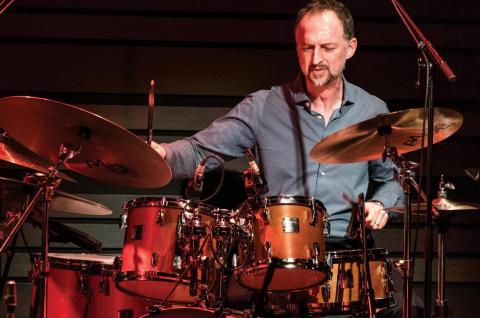From Grammy Winner to Graduate

It might astonish members of the Berklee community to know that professor of percussion Mark Walker—a Grammy winner—had once been, in his own assessment, “a horrible student.”
“I was surprised I even graduated high school,” he says. “I was just getting high all the time and screwing off. I wasn’t getting anything done, but in music classes I did pretty good.”
Shortly after graduation, Walker dumped these bad habits as he began getting more work in his native Chicago as a drummer on stage and in the studio. Before he was out of his 20s, he had recorded with the likes of Joe Henderson and Paquito D’Rivera. He became a long-standing member of D’Rivera’s band, earned the drum chair in the world-jazz-fusion band Oregon, and played dates with a long list of greats, including Michel Camilo, Michael Brecker, Eliane Elias, and Lyle Mays. He joined the Berklee faculty in 2001.
But despite all he had accomplished, Walker never let go of the idea of going to college and seeing what kind of student he would be the second time around.
“I always felt that I had plenty to learn and that my cup was not full,” he says. After an impromptu conversation with Carin Nuernberg, Berklee’s vice president of academic strategy, Walker decided to take her up on a suggestion to pursue a bachelor’s degree through Berklee Online.
He enrolled as an interdisciplinary music studies major in 2016, studying music production, voice, music business, and jazz composition; and taking courses such as Performing with Ableton Live, Writing Hit Songs, Arranging for Strings and Woodwinds, and Songwriting for Film and TV.
“It was about developing skills, and there were some things I tried that I had never thought I’d really have an affinity for, like songwriting and singing,” he says.
Although Walker earned a Grammy nomination in the Best Instrumental Composition category in 2008 for “Deep Six,” an Oregon track, at that time he didn’t self-identify as a composer and didn’t feel able to combine words and music.
One course that helped him make progress was music therapy.
“Suzanne Hanser is a total master,” he says of Berklee’s founding music therapy chair. He remembers her online course as being transformative because it helped him to be a more creative musician with better access to his own best ideas.
“It helped me to go deeper, to get into the space, and then see what comes out,” he says. “I would sit at the piano and not come up with anything. Then I would try one of [her] exercises, and—bam!—ideas are coming a mile a minute.”
Some of those creations became part of Walker’s capstone project, the album You Get What You Give, a collection of recordings he released in April as the first record under his own name.
In May, he graduated summa cum laude, proving to himself that he is a stellar student after all.




